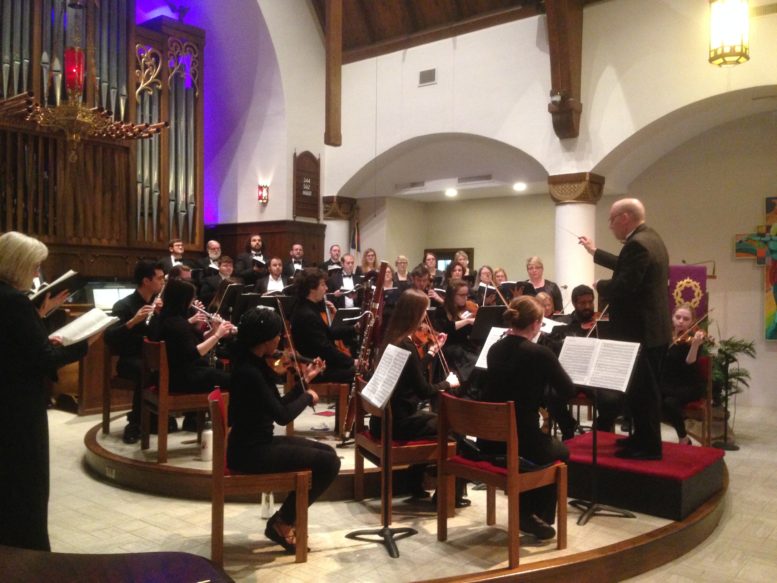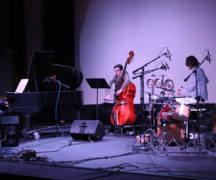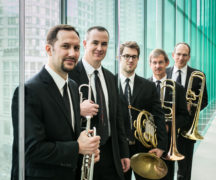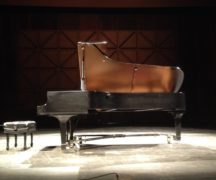By DAVID DUPONT
BG Independent News
Liturgy and drama are one in Bach’s St. John Passion.
The theatrical elements – a narrator, dialogue, and the evocative underscoring for small orchestra—are undeniable. Yet the message and the story almost demand the setting of a church. Yes, it is presented in a concert hall, but that’s akin to a staged reading of a play as opposed to a fully staged production. The St. John Passion was fully in its element on Palm Sunday afternoon in Hope Lutheran Church in Toledo.
The Passion, one of two that have come down to us from Bach, the other being the monumental St. Matthew, was presented by musicians from Bowling Green State University.
The performance brought together the Early Music Ensemble, directed by Arne Spohr, the University Choral Society directed by Mark Munson, who also conducted the work, organist Michael Gartz, and voice faculty taking on the principal roles and solos.
Munson said he’s been waiting for Easter to fall late enough in the semester to be able to prepare the Passion for presentation during Holy Week.
So on Good Friday, April 14, the St. John Passion will be presented at 7 p.m. in First United Methodist Church in Bowling Green as the community commemoration of the day.
The Passion was first performed in 1724, revised over time, though the final version reverted to much the same as it was originally performed.
As presented in Bach’s time, a sermon would be preached between parts one and two.
Those in attendance Sunday were advised not to applaud between the two movements. Spohr read several verses of the gospel in Martin Luther’s German translation between the sections.
The Passion develops on several fronts. The Evangelist, sung by Christopher Scholl, tells the story, with the direct quotations sung by other vocalists, including Lance Ashmore as Jesus. Interposed in the narration are reflections – chorales sung by the 40-voice choir and arias sung by four soloists alto Ellen Scholl, soprano Chelsea Cloeter, tenor Christopher Scholl, tenor, and bass/baritone Ashmore.
Underneath the orchestra provides musical commentary and sets the scene. The opening passage with woodwinds and restless strings, musical establishes the theme that contrasts the degradation and horror of the passion with the glory of the redemption. The belief that Jesus is brought so low to bring humanity so high runs through the chorales and arias.
The narration is all sung in English while the arias and chorales remain in the original German. The program provides a full translation.
Christopher Scholl as Evangelist is at the center of the piece, guiding the listener through the story of the Passion. He sings the part with clarity and emotional shading. He adds a note of anger, for example, when he sings that those who came to arrest Jesus carried “weapons.”
When Peter realizes what he has done in denying he was an apostle of Jesus, Bach extends the line “wept bitterly” to heart wrenching effect.
The chorus sings the parts of the crowd. This makes the believers complicit in the death of their savior. These sections are among the most magnificent. When the mob tells Pilate he must crucify Jesus or he is not Caesar’s friend, Bach produces a canon with each voice overlapping the other, and competing to see who is most adamant.
This is the kind of performance that the University Choral Society was created to present. The choir brings together students, faculty and community members to sing just such chorale masterpieces. Over the years it has performed with the Toledo Symphony as well as the Bowling Green Philharmonia.
For the St. John Passion the Early Music Ensemble, strings and woodwinds, provides the right instrumental complement. At times during the narration it move with a beat determined by the speech-like infections of the evangelists. At other times, the ensemble provides a vigorous pulse that adds to the dramatic tension.
Solo instruments often shadow the melodies of the arias. They serve to amplify the sentiments of the aria.
Only when the Passion concluded with the choir intoning “I shall praise you eternally” and after an interval of silent reflection, did Hope Lutheran Pastor Kevin Maxey tell the audience they could express their gratitude for “the blessing” of the performance.
A standing ovation ensued, a well-deserved ovation.





